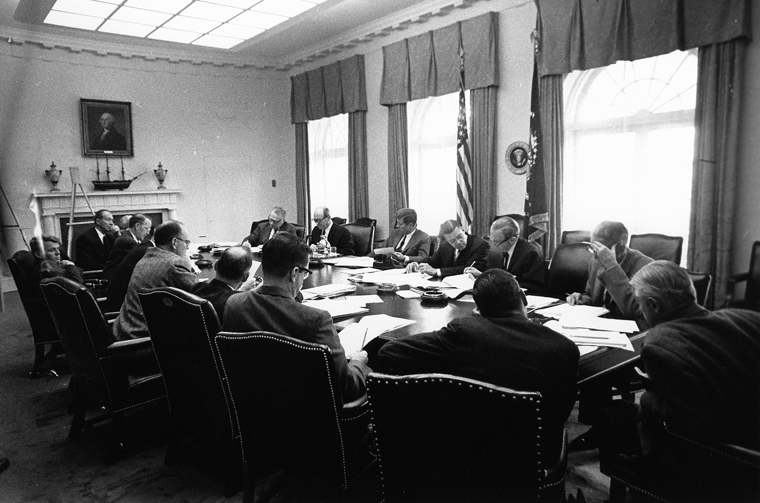The first of my "15 beliefs Things I Believe" listed to the left of this post is "Sometimes The Best Management is No Management at All." I was reminded of it by Sandy's comment on my last post. Sandy asked "I wonder what we can tell to
leaders about how to be less intimidating, even when their influence on
subordinates is unintentional?" A damn good question, and one answer — and I would love to hear others — is that sometimes the best thing a person that high status leaders can do is to physically remove themselves from the setting so that their mere presence doesn't stifle the thinking and suggestions in a group of otherwise similar-status peers.
Two examples come to mind quickly. First, and most famously, was what happened in October of 1962 when President John F. Kennedy's advisers were debating about what to do about the Cuban Missile Crisis, when the Soviet Union was taking steps to place missiles topped with nuclear weapons just 90 miles from Florida. Kennedy not only gathered experts with diverse opinions and knowledge and encouraged them to express their opinion. As Irving Janis reports in his writings on Groupthink, at one point, Kennedy divided the larger group (pictured above) into multiple sub-groups and asked each to develop solutions — in order to avoid excessive and premature consensus. Kennedy also reduced the potentially stifling effects of his status as president by being deliberately absent from
these subgroup meetings, Although historians and psychologists continue to debate how important such measures to avoid groupthink were for producing the decisions that ultimately defused the crisis, I think that the more general lesson holds: sometimes the best way for a leader to reduce undue influence is to leave the room or avoid going to meetings where his or her presence will dampen frank discussion and deep examination of facts.
David Kelley, (see the TED talk on the link)founder and chairman of IDEO (where I am a fellow) has impressed me with his ability to get "lead by getting out of the way" for years. I have been to many meetings were David was careful to avoid saying too much or expressing a strong opinion in the meeting. And he has this habit that, when he thinks things in a meeting at IDEO are really starting to go well, he kind of gently slinks to the back of the room to reduce his impact. And he often quietly leaves the scene. When his opinion and authority is required, David doesn't hesitate to interject. But I've always been impressed with how sensitive David is to the power of his position (and reputation as one of the most creative people on the U.S. business science), and like Kennedy did so brilliantly, understands the power of leading by getting out of the way.
Again, this is just one perspective on how people with high status can take actions to avoid stifling the ideas and suggesions generated by those who don't have as much power and prestige. I would love to hear others.
